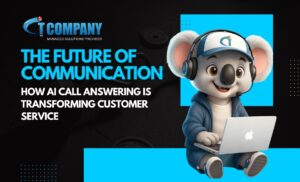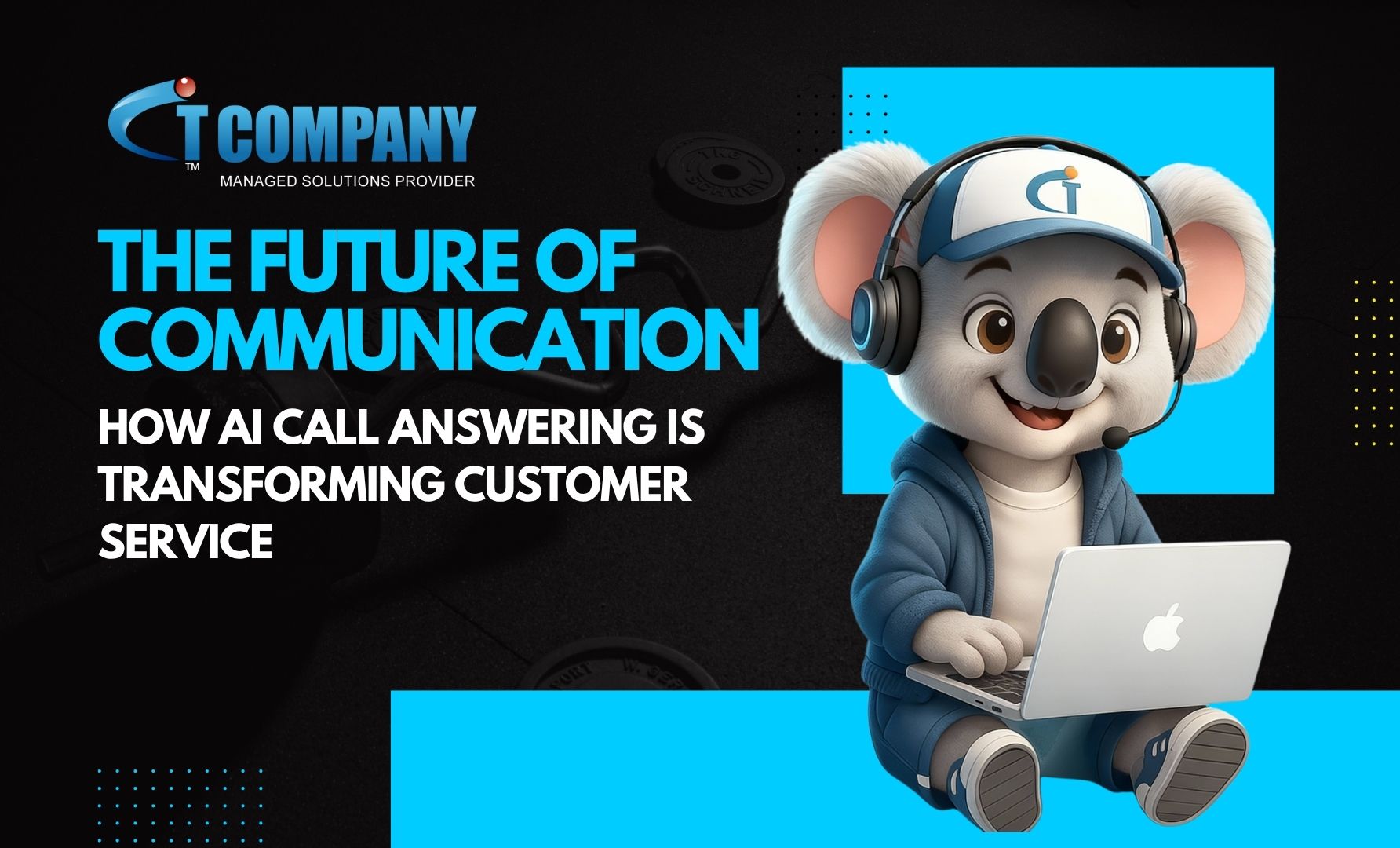Introduction
In a world where instant communication defines success, one missed call can mean one lost customer, one lost lead, or one lost opportunity. Businesses—especially in tech and service-driven industries—are realizing that traditional call centers and voicemail systems just can’t keep up with today’s customer expectations. That’s where AI Call Answering steps in. It’s not just a trend or a futuristic gimmick; it’s a genuine shift in how modern businesses manage customer engagement. For IT companies and service providers, AI-powered call answering is quickly becoming an operational necessity rather than an optional add-on. Let’s explore how AI Call Answering works, why it’s changing the game, and what it means for the future of customer communication.

What is AI Call Answering?
At its core, AI Call Answering is the fusion of artificial intelligence and voice technology to automate how businesses handle incoming calls. Unlike traditional call centers, where human operators manually answer, route, and record messages, AI call answering systems use natural language processing (NLP), machine learning, and speech recognition to understand caller intent, respond naturally, and take the right action—instantly. Imagine a virtual assistant that can:
- Greet callers professionally 24/7
- Identify the purpose of the call
- Route it to the right department or person
- Schedule appointments
- Take detailed messages
- Even handle frequently asked questions
And it does all this without fatigue, delays, or errors. For an IT company, this means consistent availability, smarter lead handling, and a major boost in productivity.
Why Businesses are Turning to AI Call Answering
Modern businesses operate in a digital-first environment. Customers want immediate responses, whether they’re reaching out through chat, email, or a phone call. However, maintaining round-the-clock human support is expensive and often inefficient. Here’s why AI Call Answering is rapidly becoming the preferred solution:
1. 24/7 Availability
AI doesn’t clock out. With AI-powered systems, your business is always open. Customers can call anytime—after hours, during weekends, even on holidays—and still receive a professional response. This is especially critical for IT companies that manage technical support or urgent service requests.
2. Instant Response and Zero Wait Time
No one likes waiting on hold. AI Call Answering ensures every call is answered instantly, improving customer satisfaction and reducing call abandonment rates. The result? Happier customers, fewer missed leads, and a stronger brand reputation.
3. Cost Efficiency and Scalability
Hiring and training a 24/7 human call center is expensive. With AI, costs remain predictable. You can handle hundreds—or thousands—of calls simultaneously without increasing staffing. For growing IT businesses, this scalability is invaluable.
4. Smarter Lead Capture
Every incoming call is a potential lead. AI Call Answering systems can qualify leads automatically, capture caller information, and sync it directly with your CRM or lead management tools. When combined with AI Lead Generation tools, this creates a fully automated funnel—ensuring no lead slips through the cracks.
5. Consistent Professionalism
AI doesn’t have bad days. Every caller receives the same professional tone, personalized greeting, and accurate information every single time. This level of consistency builds trust, which is vital for tech-focused businesses managing sensitive client relationships.

Inside the Technology: How AI Call Answering Works
Behind every seamless AI call interaction is a network of intelligent technologies working in harmony.
- Speech Recognition (ASR) – Converts spoken language into text so the AI can understand caller intent.
- Natural Language Processing (NLP) – Enables the AI to interpret meaning, emotion, and context behind the caller’s words.
- Machine Learning – Improves accuracy and response quality over time by learning from each interaction.
- Text-to-Speech (TTS) – Converts AI-generated responses back into a natural, human-like voice.
- Integrations – Connects with CRMs, calendars, ticketing tools, and business applications for seamless automation.
Together, these components allow the AI to listen, think, and respond intelligently—just like a trained human agent, but faster and with greater consistency.
The Real-World Benefits for IT Companies
As an IT company, your reputation hinges on responsiveness, accuracy, and technical competence. Here’s how AI Call Answering directly strengthens those pillars:
1. Improved Client Communication
When clients call for technical support or service inquiries, the AI instantly answers, understands their request, and directs it appropriately. No more lost tickets or delayed callbacks.
2. Streamlined Helpdesk Operations
Integrated with your AI Chat Assistant and Virtual Admin Assistant, call answering becomes part of a unified support ecosystem. Whether it’s a phone inquiry or chat request, your AI ecosystem ensures fast, accurate responses across every channel.
3. Data-Driven Insights
AI doesn’t just answer calls—it collects and analyzes data. You can track call volume, peak times, customer sentiment, and keyword trends. These insights help you refine operations, optimize staffing, and even predict customer needs.
4. Enhanced Professional Image
A missed call can make your company look unreliable. AI Call Answering ensures every call is handled efficiently, projecting a modern, tech-savvy brand image that inspires confidence.
The Human Touch in AI Communication
One common misconception about AI automation is that it removes the “human” aspect of service. In reality, modern AI systems are built to enhance human communication—not replace it. Advanced conversational AI understands tone, detects frustration, and uses natural phrasing to make interactions feel warm and personal. For more complex or sensitive calls, AI can seamlessly transfer to a live agent, ensuring the human touch remains where it matters most. Think of AI Call Answering as your first line of communication—a digital team member who handles the routine and routes the exceptional.
Integrating AI Call Answering Into Your Business
Transitioning to AI-powered call management doesn’t have to be complex. Here’s a simplified roadmap to integrating AI Call Answering into your IT operations:
Step 1: Identify Your Call Patterns
Analyze when calls come in, what they’re about, and who handles them. This helps you train your AI model effectively.
Step 2: Customize the AI Experience
Set up branded greetings, tone of voice, and scripts that reflect your company’s personality. AI systems today allow for deep customization—so your callers always feel like they’re speaking to your team.
Step 3: Integrate with Your Tools
Connect AI Call Answering with your CRM, ticketing, or scheduling tools. This ensures captured data flows directly into your systems for follow-up or reporting.
Step 4: Monitor and Optimize
Regularly review call logs, sentiment analysis, and performance metrics. The more you train your AI, the smarter and more accurate it becomes.

AI Call Answering and the Future of IT Service
The IT industry has always been at the forefront of automation—and communication is no exception. As more businesses embrace AI-driven service models, the role of AI Call Answering is expanding beyond just voice calls.
Omni-channel Integration
AI Call Answering is evolving into AI Communication Hubs—where phone, chat, email, and social channels are connected through a single AI engine. For instance, a customer might start a chat on your website, call your hotline later, and receive consistent support because the AI already knows their history.
Voice Analytics and Predictive Insights
Next-gen systems analyze tone and emotion to assess customer satisfaction in real time. They can even flag unhappy callers for human follow-up before issues escalate.
Intelligent Workflows
Integrating AI Call Answering with AI Virtual Assistants allows you to automate tasks such as scheduling maintenance, following up on leads, or confirming appointments. The result? A fully interconnected, intelligent communication system that drives both efficiency and customer loyalty.
Common Misconceptions About AI Call Answering
Let’s address a few myths that sometimes make businesses hesitant to adopt this technology:
AI Can’t Sound Human
Modern AI uses natural language generation and emotional tone modeling, creating responses that sound warm and conversational. In fact, many callers can’t tell they’re speaking to AI.
It’s Too Expensive
AI Call Answering reduces long-term costs by eliminating the need for full-time receptionists or call center contracts. It’s scalable—you pay for what you need, not idle hours.
AI Will Replace People
AI is designed to augment, not replace, your team. It handles repetitive tasks, freeing human agents to focus on complex and relationship-driven interactions.
How AI Call Answering Enhances Customer Experience
At the heart of every AI system lies a simple goal: better customer experience. AI Call Answering achieves this by:
- Reducing hold times
- Providing instant answers
- Personalizing interactions
- Ensuring every call is handled correctly
- Capturing actionable data for follow-ups
For tech businesses, where response time and reliability define client trust, this is a game-changer.
Choosing the Right AI Call Answering Partner
When selecting an AI Call Answering solution, consider these key factors:
- Customization – Can you tailor greetings and workflows?
- Integration – Does it connect with your CRM, ticketing, or chat tools?
- Scalability – Can it grow with your business?
- Analytics – Does it offer real-time reports on call performance?
- Support – Do you have access to technical help or configuration assistance?
A strong provider will ensure the system feels like a seamless part of your brand—never a third-party add-on.
Final Thoughts
AI Call Answering is more than just another tech innovation—it’s the next logical step in intelligent communication. For IT company and modern businesses alike, it delivers the perfect blend of efficiency, scalability, and professionalism. It ensures no call goes unanswered, no lead goes uncaptured, and no customer feels neglected. As AI continues to evolve, so will the ways we connect, respond, and serve our clients. The future of business communication isn’t just human or machine—it’s the perfect synergy of both. If your company is ready to modernize how it connects with customers, AI Call Answering is the smartest place to start.
FAQ’s
What is AI Call Answering and how does it work?
AI Call Answering uses artificial intelligence and voice recognition to answer incoming calls automatically. It understands caller intent, provides instant responses, routes calls, and captures key details — all without human intervention.
Can AI Call Answering replace a live receptionist?
Not entirely. AI Call Answering handles routine and repetitive calls efficiently, while complex or sensitive issues can be seamlessly transferred to a live agent. It’s designed to complement your human team, not replace them.
What are the benefits of AI Call Answering for IT companies?
For IT businesses, AI Call Answering ensures 24/7 availability, faster client response times, and smarter lead capture. It enhances customer experience, reduces workload on support teams, and helps maintain a professional image at all times.

